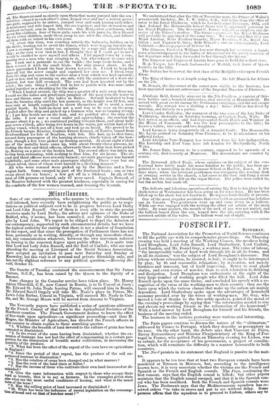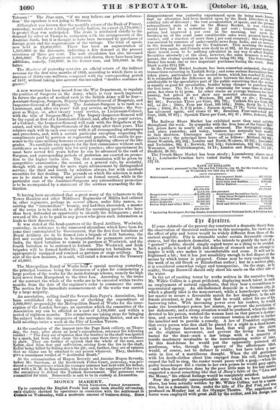POSTSCRIPT.
SATURDAY.
The National Association for the Promotion of Social Science continues to fill the public eye with its comprehensive proceedings. On Thursday evening was held a meeting of the Working Classes, the speakers being Lord Brougham, Lord John Russell, Lord Shaftesbury, Lord Carlisle, Lord Sandon, and Mr. Daniel Guy, a working man. The value of labour, "the inexpressible value of hard work through life in all its forms, and in all its stations," was the subject of Lord Brougham's discourse. But labour without relaxation, he insisted, is bad ; it ought to be interrupted by play, by fit and reasonable relaxation; by recreation, not merely harmless and innocent, but of itself improving. Better to read ghost' stories, and even stories of murder, than to seek relaxation in drinking and dissipation. Lord Brougham was enthusiastic at the sight of the very large number of working people who filled the hall. Lord John Russell spoke upon the same theme, and concluded his speech with a re- cognition of the value of the working-men to their country : they are the basis upon which the various classes that make up the nation are mainly dependent. Lord Shaftesbury spoke upon the advantages of household economy presided over by the wives of working-men. Mr. Guy, who moved a vote of thanks to the five noble speakers, pointed the moral of the evening's proceedings by saying that "the reformation needed to rise and elevate my working friends in the reformation of the homestead." With a brief answer by Lord Brougham for himself and his friends, the business of the meeting ended.
The business in the sections yesterday were various and interesting.
The Paris papers continue to discuss the nature of the "ultimatum" addressed by France to Portugal, which they describe as peremptory in its tone. On the other hand, the Debate says that Viscount de Paiva, Envoy Extraordinary and Minister Plenipotentiary of the King of Por- tugal in France, who quitted Paris on Thursday evening for Lisbon, was to submit, for the acceptance of his government, a project of concilia- tion, which will terminate the difficulty in a manner honourable to both countries.
The Nord persists in its statement that England is passive in the mat- ter.
It appears to be too true that at least two European consuls have been murdered at Tetouan in Morocco, but, according to the intelligence known here, it is very uncertain whether the victims are the French and Spanish or the French and English consuls. The Pays, confirming the first rumour, says that the English consul is killed; but other papers maintain that the English consul escaped, and that it is the Spanish con- sul who has been sacrificed. Both the French and Spanish consuls were Jews. The Toulonnais says that the Mediterrannean squadron has re- ceived orders "to take in stores and put to sea without delay. Some persons affirm that the squadron is to proceed to Lisbon, others say to
Tetouan !" The Pays says, "if we may believe our private informa- tion" the squadron is not going to Morocco.
Although it was known that the monthly return of the Bank of France, yesterday, would show a falling-off in the bullion, its extent (1,770,0001.) is greater than was anticipated. The drain is attributed chiefly to the
• demand for silver at Vienna in connexion with the arrangements of the Austrian Bank, but it is thought to have been increased by purchases of foreign grain and the requirements of the vintage. The total of specie now held is 22,000,000/. There has been an augmentation of 1,350,0001. in the discounts, indicating a fair demand at the present minimum of three per cent. The note circulation has also increased 1,800,000/. To the advances on rentes and shares, therp have been large additions, namely, 750,000/. in the former case, and 290,0001. in the latter.
The Xanitcar of yesterday contains an official return of the indirect revenue for the first nine months of 1858, according to which there is an increase of thirty-one millions, compared with the corresponding period of 1857, without taking into account the tax called "doubles centimes de guerre."
A new warrant has been issued from the War Department, to regulate the position of Surgeons in the Army, which is very much improved. In future the grades of medical rank in the British Army will be four- Assistant-Surgeon, Surgeon, Deputy-Inspector-General of Hospitals, and Inspector-General of Hospitals. The Assistant-Surgeon is to rank as a Lieutenant, and, after six years' full pay service, as Captain ; the Sur- geon as Major, or, after twenty years' service, as Lieutenant-Colonel, with the title of Surgeon-Major. The Deputy-Inspector-General will be the equal at first of a Lieutenant-Colonel, and, after five years' service, of a Colonel ; the Inspector-General will rank with the Brigadiers at the outset, and with the Major-Generals of the Army after three years. This relative rank will in each ease carry with it all corresponding advantages and precedents, and, with a certain particular exception respecting the compliments paid by garrison or regimental guards, will entitle its pos- sessor to the same military honours as are paid to fighting officers of the like grades. No candidate can compete for the first commission without such certificates as would qualify him for civil practice; after appointment he must have served five years before he can be advanced to the rank of Surgeon, and corresponding periods of probation are exacted on promo- tion to the higher ranks also. The first commission will be given by competitive examination ; the second, as a general rule, by seniority, though with an opening for more rapid advancement by distinguished service ; the third and fourth by selection always, but with excellent securities for fair dealing. The grounds on which the selection is made are to be stated in writing and placed on formal record, while in the particular ease of the Assistant-Surgeons any extraordinary promotion is to be accompanied by a statement of the services warranting the dis- tinction.
It having been ascertained that a great many of the volunteers to the Tower Hamlets and other Middlesex Regiments of Militia had enlisted in other regiments, perhaps in several others, under false names, re- ceiving the "intermediate" bounty, and had then absconded, a muster of the corps is to be ordered, to afford the recruiting parties who have thus been defrauded an opportunity to identify the delinquents ; and a reward of 208. is to be paid to any person who gives such information as leads to their discovery.
It was stated at the head-quarters of the Royal Artillery, Woolwich, yesterday, in reference to the rumoured alterations which have been for some time contemplated by Government, that the first four battalions of Royal Artillery are to be formed into a brigade of field batteries, the Ant and second battalions to be despatched for permanent service in India, the third battalion to remain in garrison at Woolwich, and the fourth battalion to be stationed in Ireland. The Woolwich and Irish brigades will be formed forthwith ; the remaining ten battalions to be appropriately equipped and retained as garrison or siege artillery. The cost of the new measure, it is said, will entail a demand on the Treasury of 40,0001.
The Metropolitan Board of Works herra special meeting yesterday, the principal business being the discussion of a plan for commencing a large portion of the works for the main drainage scheme, namely the high level sewer from Hampstead to the river Lea. According to the terms of the contract the whole of the works are to be executed within twelve months from the date of the engineer's order to commence the same. The motion for the immediate commencement of the works was carried by a large majority.
An association, calling itself the Sewer-Rate Payer's Association, has been established for the purpose of checking the expenditure of 3,000,000/. proposed pay the Metropolitan Board of Works for the inter- ception of the London Sewage, an operation which the committee of the Association say can be effected at a cost of 1,100,000/. and within a period of eighteen months. The committee are taking steps for bringing the subject before the ratepayers of the metropolitan district, and are to hold meetings twice a week at the City of London Tavern.
At the conclusion of the inquest into the Page Bank colliery, on Thurs- day s the Jury, after about an hour's consultation, returned the following verdict "The Jury are of opinion that the brattice in the shaft was ignited by a spark, but from what cause the spark came there there is no evidence to show. They are further of opinion that the whole of the men, save llellet, died from fear and suffocation, arising from the fire in the shaft, Kellet being killed by falling down the pit; and, further, they are of opinion that no blame can be attached to any person whatever. They, therefore, give a unanimous verdict of "Accidental Death."
At the reixamination of Hugon Beverdy and Antoine Hugon Beverdy, before Mr. Burcham, at the Southwark Police Court, yesterday., was pro- duced a correspondence which the younger prisoner had held with his father, and with all. 11. de Boisaerrolle, who seems to be the employer of the two in the conspiracy to defend the Turkish Government. The prisoners were committed for trial. Bohmerrolle is said to be in custody at Alexandria.



























 Previous page
Previous page